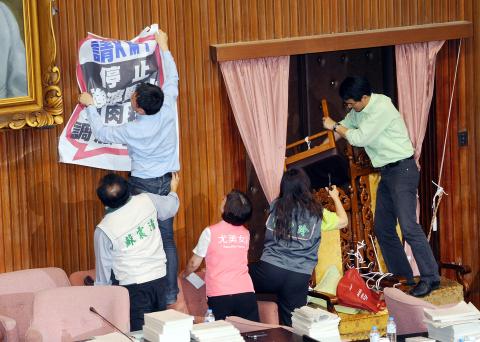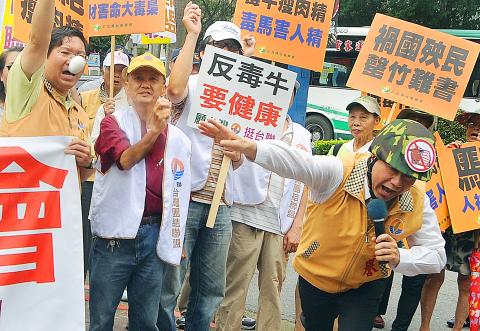The executive branch last night asked the legislature to hold a provisional session to vote on a bill that would allow beef imports containing residues of the livestock feed additive ractopamine after the legislative session ended at 6pm yesterday without voting on the beef issue.
The Presidential Office and the Executive Yuan issued the call following a three-hour meeting between President Ma Ying-jeou (馬英九), Premier Sean Chen (陳冲), Legislative Speaker Wang Jin-pyng (王金平) and top officials on solutions to the stalled draft bill on beef -containing ractopamine residues.
Chinese Nationalist Party (KMT) caucus whip Lin Hung-chih (林鴻池) last night said the caucus would table a motion for an extra session next week to pass the amendment to the Act Governing Food Sanitation (食品衛生管理法).

Photo: Lo Pei-der, Taipei Times
“The beef issue will be the only subject discussed at the provisional session. We hope that it can be held next week,” he said.
After the KMT caucus submits the proposal, Wang must call an informal meeting for lawmakers to decide whether to hold the extra session.
The conclusion reached at the meeting called by Ma last night departed from the KMT caucus’ earlier position, with KMT lawmakers supporting a proposal at a caucus meeting held on Thursday to ask the Executive Yuan to issue an executive order to relax the ban on beef containing ractopamine.

Photo: Liao Chen-huei, Taipei Times
Meanwhile, Democratic Progressive Party caucus whip Ker Chien-ming (柯建銘), said the caucus would do everything in its power to block the amendment.
“It is unavoidable that there will be a fight if the KMT tries to ram through the amendment,” Ker said.
In light of the failure of the legislature to pass the amendment yesterday, the last day of the legislative session, the American Institute in Taiwan (AIT) expressed the hope that “the Executive Yuan will finally be able to bring this to a speedy resolution.”
“We maintain that US beef is safe and remind Taiwanese consumers that millions of people in the US, Canada, Mexico, Japan, Korea, and many other countries around the world have continued to enjoy US beef without a single report of ill effects linked to ractopmaine,” AIT spokesperson Sheila Paskman said.
The AIT was “disappointed that some in Taiwan chose to make the discussion about US beef a political issue and intentionally provide misleading and in many cases false information to political gains,” Paskman said.
Earlier yesterday Ma reiterated his expectation that the issue of US beef imports would be resolved as soon as possible when meeting with Harvard University professor Ezra Vogel at the Presidential Office. He said that lifting the ban on the import of US beef containing ractompaine residue would facilitate Taiwan’s trade relations with the US and other countries.
Ma said this was a “critical moment” for Taiwan to finally deal with the issue of US beef imports, so as to speed up trade negotiations with the US and other trade partners.

AGING: As of last month, people aged 65 or older accounted for 20.06 percent of the total population and the number of couples who got married fell by 18,685 from 2024 Taiwan has surpassed South Korea as the country least willing to have children, with an annual crude birthrate of 4.62 per 1,000 people, Ministry of the Interior data showed yesterday. The nation was previously ranked the second-lowest country in terms of total fertility rate, or the average number of children a woman has in her lifetime. However, South Korea’s fertility rate began to recover from 2023, with total fertility rate rising from 0.72 and estimated to reach 0.82 to 0.85 by last year, and the crude birthrate projected at 6.7 per 1,000 people. Japan’s crude birthrate was projected to fall below six,

US President Donald Trump in an interview with the New York Times published on Thursday said that “it’s up to” Chinese President Xi Jinping (習近平) what China does on Taiwan, but that he would be “very unhappy” with a change in the “status quo.” “He [Xi] considers it to be a part of China, and that’s up to him what he’s going to be doing, but I’ve expressed to him that I would be very unhappy if he did that, and I don’t think he’ll do that. I hope he doesn’t do that,” Trump said. Trump made the comments in the context

SELF-DEFENSE: Tokyo has accelerated its spending goal and its defense minister said the nation needs to discuss whether it should develop nuclear-powered submarines China is ramping up objections to what it sees as Japan’s desire to acquire nuclear weapons, despite Tokyo’s longstanding renunciation of such arms, deepening another fissure in the two neighbors’ increasingly tense ties. In what appears to be a concerted effort, China’s foreign and defense ministries issued statements on Thursday condemning alleged remilitarism efforts by Tokyo. The remarks came as two of the country’s top think tanks jointly issued a 29-page report framing actions by “right-wing forces” in Japan as posing a “serious threat” to world peace. While that report did not define “right-wing forces,” the Chinese Ministry of Foreign Affairs was

PREPAREDNESS: Given the difficulty of importing ammunition during wartime, the Ministry of National Defense said it would prioritize ‘coproduction’ partnerships A newly formed unit of the Marine Corps tasked with land-based security operations has recently replaced its aging, domestically produced rifles with more advanced, US-made M4A1 rifles, a source said yesterday. The unnamed source familiar with the matter said the First Security Battalion of the Marine Corps’ Air Defense and Base Guard Group has replaced its older T65K2 rifles, which have been in service since the late 1980s, with the newly received M4A1s. The source did not say exactly when the upgrade took place or how many M4A1s were issued to the battalion. The confirmation came after Chinese-language media reported